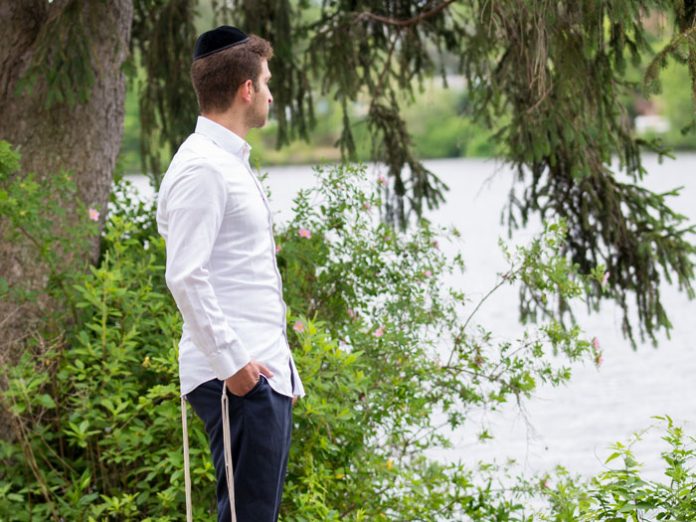‘‘Hey, you!” the security guard at Moscow’s Sheremetyevo International Airport called out to Yitzchok Yoselovksy, a young bachur on his way home from yeshivah for Pesach. “Come with me!”
It was supposed to have been an uneventful stopover on a routine flight from Eretz Yisrael to New York. The zman had come to an end, and Yitzchok was looking forward to spending time with his family.
“After a two-hour stopover, it was time to board the next flight, so I got in line. As soon as I got to the front and showed them my passport, they asked me to step aside. It was strange; while I was waiting, they had announced my name over the loudspeaker several times, directing me to report to security. But each time I went over to a security booth, they either didn’t speak English or didn’t know what it was all about, so I’d gone back to my seat.”
As soon as he got to the gate he realized that something was up.
“The security person had a paper with my name on it, and when I showed him my passport he already knew who I was. I was led into a side room where they had my suitcase and an X-ray machine. They asked me if I had any contraband inside. I said no.”
As he was about to discover, there actually was something he shouldn’t have had in his suitcase, which the Russians had found when the bag went through the machine. They’d decided to investigate further.
“I was bringing home some souvenirs. Souvenir bullets. From Israel.”
Was he planning on giving them out to friends as gifts? Was he planning on using them at a shooting range?
“No,” he replied honestly. “I just thought I’d put them on a shelf or stick them in a desk drawer.
“They were speaking in Russian, so I didn’t understand what was going on until they showed me the bullets. When I caught on I said, ‘Oh, okay. I didn’t know I wasn’t supposed to have them. If it’s not allowed, then just take them—no problem! I’m not looking to cause any trouble.’
“In the beginning they were okay. They brought over a few people and filled out some official-looking papers. Forty-five minutes later they let me go back to the terminal and said, ‘If we need you, we’ll call you.’”
Unfortunately, by the time Yitzchok was released he had missed his flight, and the small group of friends he’d been traveling with were already winging their way home. From that point on, Yitzchok was on his own.
“I tried to find out when the next flight to New York was leaving, but that wouldn’t be until the following morning. I was stuck in the airport. I went to the lounge and called my parents to tell them what was happening, so they shouldn’t worry when I didn’t get off the plane. A few hours later I went over to the airline counter to try to book a new flight. All of a sudden I was surrounded by three or four policemen who asked me to come with them. At that point, I started getting nervous. They took me back to the room where my luggage was and informed me that I was being assigned a lawyer. ‘We’re writing up a whole case against you,’ they said.”
What were the charges?
“In the beginning I was charged with possession and transportation of ammunition without a license, and bringing it into their country illegally.”
When the Israelis had scanned his bag in Ben-Gurion Airport, had they notified him that it might be a problem?
“No. No one said anything.”
How did that first conversation with the lawyer go?
“He told me I had a court date the following day. ‘They’ve put together a serious case against you,’ he said. ‘They really want to make an example out of you, but hopefully we’ll work it out.’
By then it was already Thursday night.
“In the meantime, they made me stay in an office in the airport until the hearing the next morning. At least they allowed me to call my parents, who immediately started calling every Jewish organization in the world they could think of. They finally managed to get in touch with Chabad in Moscow, and they promised to come with me to court. They advised me not to talk to the appointed lawyer.”
This would be his last conversation with his parents for a very long time.
“The next morning they drove me to the courthouse with all my luggage. Although I couldn’t follow what was being said, I got the distinct impression that the judge thought the whole thing didn’t make sense. I could see that he was hesitant to even take on the case. I didn’t even have a visa to be in Russia—I was only there for a stopover—so it was clear that I had no intention of bringing anything into the country. In the end he said that I should come back on Monday.”
Stuck in the Airport
“Back I went to the airport for Friday, Shabbos and Sunday. I was basically sitting on the couch in that same office the entire time and was only allowed out to go to the bathroom. On Monday morning they drove me back to court.”
What was Shabbos like?
“They tried to get me a visa so I could leave the airport, but it didn’t work. Chabad sent over some Shabbos food and I just davened. I was very grateful that they also sent some reading material, like Jewish magazines and stuff. That first Shabbos felt really long. I was worried and scared and had no idea what was going to happen to me.”
Monday finally dawned.
“When I told the lawyers that I’d been confined to a room in the airport, they repeated it to the judge. ‘You guys are crazy!’ he sputtered. ‘You can’t keep him locked up in a room like that.’ He insisted that I be given accommodations in a hotel. So on Monday night I stayed in a hotel near the airport terminal.





















